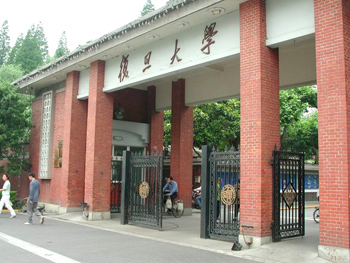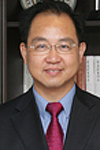President Patrick White, Dean of the College Gary Phillips, and two faculty members will travel to China Tuesday for an unprecedented opportunity to establish relationships with Chinese universities.
Economics Professor Kay Widdows and Assistant Professor of Chinese Qian Pullen will accompany the Colleges’ top two administrators to Shanghai and Beijing.
 The group will meet with leaders from Fudan University and East China Normal University in Shanghai. They will also participate in the 39th annual China Conference for International Education being held in Beijing.
The group will meet with leaders from Fudan University and East China Normal University in Shanghai. They will also participate in the 39th annual China Conference for International Education being held in Beijing.
 "All of us at Wabash are excited about this historic trip to China," said Wabash President White. "Our strategic plan calls for us to expand international learning opportunities for Wabash students, and the $700,000 Mellon Foundation grant enabled us to establish an Asian Studies Program.
"All of us at Wabash are excited about this historic trip to China," said Wabash President White. "Our strategic plan calls for us to expand international learning opportunities for Wabash students, and the $700,000 Mellon Foundation grant enabled us to establish an Asian Studies Program.
"Our trip to China will build on connections we have already established with Fudan University and are initiating with East China Normal University, and will lead to enriched learning in Chinese studies at Wabash, as well as new opportunities for our students and faculty in China and for Chinese students and faculty at Wabash. Our relationships with alumni and friends of the College in China have helped drive this project and will help us make the most of what we learn and the contacts we nurture."
A trip to Fudan University was planned for the fall of 2008 then canceled after the economic downturn. Widdows suggested the College is now better positioned to take advantage of the exchange. The John H. Schroeder Interdisciplinary Chair of Economics noted the hiring of Pullen, the Mellon Grant, and the Visiting Professorship in Chinese as stronger footing to establishing ties.
 “The College has an extraordinary, I believe unprecedented, opportunity on this trip to make face-to-face contact with significant Chinese educators and leaders,” Dean of the College Gary Phillips said. “This could have a significant impact on the quality of teaching and learning for Wabash students and faculty. It could well open doors for other ways to strengthen the College in advancement and admissions. We will be meeting with the institutional leaders at Fudan University and East China Normal University to craft cooperative working arrangements between Wabash and these two major Chinese universities.”
“The College has an extraordinary, I believe unprecedented, opportunity on this trip to make face-to-face contact with significant Chinese educators and leaders,” Dean of the College Gary Phillips said. “This could have a significant impact on the quality of teaching and learning for Wabash students and faculty. It could well open doors for other ways to strengthen the College in advancement and admissions. We will be meeting with the institutional leaders at Fudan University and East China Normal University to craft cooperative working arrangements between Wabash and these two major Chinese universities.”
Wabash connections have also facilitated this rare opportunity to work with Chinese education leaders. Trustee Peter Kennedy ’68 set up the initial contacts with Fudan for the planned 2008 trip. The Secretary General of China’s Education Association for International Exchange, Jiang Bo, invited President White as a special guest to the plenary session of the conference.
 “The trip to the conference in Beijing will place Wabash College symbolically and the delegation physically at the heart of an international conference and exposition,” Phillips said. “Dr. Jiang Bo, a good friend of the College whose son attended Wabash and tragically died in a car accident in Crawfordsville in 2006, has invited Pat White to be his honored guest. Dr. Jiang is the second highest ranking Chinese official responsible for international education. It will be a unique opportunity to meet officials and educators at the highest levels, to be present when the Minister of Education announces a five-year national initiative to engage and study American Liberal Arts education, and to establish relationships with our Chinese counterparts from institutions across the country and around the world.”
“The trip to the conference in Beijing will place Wabash College symbolically and the delegation physically at the heart of an international conference and exposition,” Phillips said. “Dr. Jiang Bo, a good friend of the College whose son attended Wabash and tragically died in a car accident in Crawfordsville in 2006, has invited Pat White to be his honored guest. Dr. Jiang is the second highest ranking Chinese official responsible for international education. It will be a unique opportunity to meet officials and educators at the highest levels, to be present when the Minister of Education announces a five-year national initiative to engage and study American Liberal Arts education, and to establish relationships with our Chinese counterparts from institutions across the country and around the world.”
Pullen, the College's first tenure-track professor in Chinese, said the unexpected trip to the 2011 China Education Expo in Beijing will broaden the knowledge of China's ongoing undergraduate education reform of the old socialist system. "We will be connecting with officials and leaders of the Chinese universities in Beijing, and become familiar with both reform policies from the central government and specific reforming plans initiated by various institutes at the provincial level. This will be extremely beneficial to both the College's further collaborations with the Chinese universities and the development of the Asian Studies program."
The group leaves Tuesday, October 11 and travels to Shanghai to meet with Fudan University leaders. They travel to Beijing Friday for the weekend conference then return to Shanghai Monday morning to meet with officials at East China Normal. The Wabash group will return Wednesday, October 19.
The Mellon Grant provided funding to start an Asian Studies program. One of the first steps was to hire a tenure-track Chinese professor, which was accomplished last summer with Pullen’s position. The grant also sends four Wabash and four DePauw professors for an intensive program in Hawaii during the summer.
English Professor Agata Szczeszak-Brewer, Philosophy Professor Mark Brouwer, Spanish Professor Gilberto Gomez, and Music Professor Peter Hulen participated last summer. The next step would be for each of those professors to work on a project next summer in China.
.jpg) “What I would like to do is get an agreement with Fudan, East China Normal, or both to host our faculty for short-term visits of two to three weeks, provide a research assistant to help with language, and maybe a contact to a faculty member in the field who speaks English,” Widdows said.
“What I would like to do is get an agreement with Fudan, East China Normal, or both to host our faculty for short-term visits of two to three weeks, provide a research assistant to help with language, and maybe a contact to a faculty member in the field who speaks English,” Widdows said.
“If this goes over four years we’re going to have 16 faculty that are looking for ways to develop Chinese content through a second summer visiting China.”
Widdows said East China Normal has a “well-regarded Chinese-as-a-second language program.” She hopes to discuss a program to bring a graduate student to Wabash “for a year or perhaps two years to teach Chinese.”
But the relationships built during the trip could lead to more than faculty exchange. “It could be programs, immersion learning, or summer schools,” Widdows suggested.
The College hopes to promote the Center of Inquiry in the Liberal Arts at the Conference as an assessment ally for the Chinese as they explore liberal arts education.
.jpg) “We will explore opportunities to bring Chinese education experts to the Center of Inquiry in the Liberal Arts to participate in the close assessment and teaching improvement work the Center is so known for,” Phillips said. “There may be no better place in the U.S. for Chinese educators to come than to the Wabash Center of Inquiry to learn about what makes high quality liberal arts learning work.”
“We will explore opportunities to bring Chinese education experts to the Center of Inquiry in the Liberal Arts to participate in the close assessment and teaching improvement work the Center is so known for,” Phillips said. “There may be no better place in the U.S. for Chinese educators to come than to the Wabash Center of Inquiry to learn about what makes high quality liberal arts learning work.”
 The other Wabash connection providing a big assist to the trip is Hao Liu. Liu, who runs a successful international school in China, is helping with many of the trip’s logistics. He also welcomed three Wabash professors to East China Normal last year to teach in summer programs.
The other Wabash connection providing a big assist to the trip is Hao Liu. Liu, who runs a successful international school in China, is helping with many of the trip’s logistics. He also welcomed three Wabash professors to East China Normal last year to teach in summer programs.
Widdows gave great credit to Pullen, who will be on the trip, for her guidance in setting up the logistics, arranging, and planning the protocol for meeting with the university leaders.
“This trip opens a door,” Widdows said. “There are things we hope to accomplish now, but depending on personalities and institutional needs this could grow into something really important for Wabash College.”